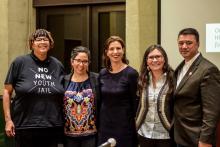On Friday, March 7, 2014, approximately 1200 immigrants held at the Northwest Detention Center (NWDC), one of the largest immigration prisons in the country, began refusing meals. The hunger strike continued for 56 days, with strikers demanding improved detention conditions and an end to deportations.
On the third anniversary of the hunger strike, activists reflected on their achievements and looked to common abolition struggles in Washington state to end policies that put people behind bars. Professor Megan Ybarra (center) represented the Department of Geography. Karen Taylor with EPIC (Ending the Prison Industrial Complex – Seattle) helped the UW community understand the long-lasting effects of juvenile detention on people’s lives, and Angélica Cházaro (UW Law School) discussed current debates around the moves to expand juvenile detention in Seattle and King County. Kris Larsen (middle right) represented FIGHT (Formerly Incarcerated Group Healing Together) to reveal the connections between incarceration and deportation in Washington. He spoke to the poor conditions in the Northwest Detention Center, fighting his deportation, and his current work in helping formerly incarcerated folks find jobs and housing. Finally, Maru Mora Villalpando (far right) reflected on the ways that the 2014 Hunger Strikes pre-figured our current struggles against expanding mass detention and deportation.
Look for the Hunger Strikers Handbook, launching in April, at www.hungerstrikershandbook.org!
This work was supported by a Scholar-Activist Project Award from the Antipode Foundation.
